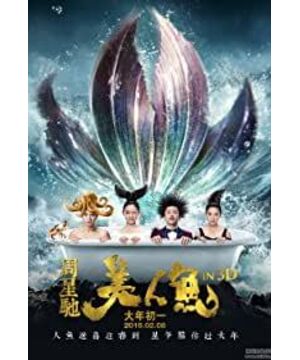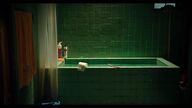Half psychedelic, half bluntly sings, "Sleeping urchin, dreams are like spirits." For Xing Ye's "The Mermaid", this sentence has an indescribable aptitude. In this movie, Zhou Xingchi is like a child who has just learned about the world and is open-mouthed, pouring out his complaints about the adult world without restraint. He cleverly used childlike expressions to utter those sentences about environmental protection and human greed, which shrouded the originally childish view like a babble with a layer of unique legitimacy. The evaluation of Stephen Chow's works is almost destined to be polarized. Just like the exaggerated expression of the movie itself, everything about Stephen Chow is exaggerated and magnified. As a passerby who has never been able to turn fans and has no reason to turn black, objectively speaking, this work is by no means amazing, but it is not disappointing. These 90 minutes are full of lovely loopholes and stubbornness. Proudly childish. Let's put it this way, in "The Mermaid", Zhou Xingchi recklessly told a fairy tale to adults, taking childishness as a kind of character, and in the filthy world he described, his pretentious, almost overkill innocence was like a resistance movement. This commercial film, released on the first day of the new year, just looks like it has a hilarious and funny shell, but in fact its core is a fairy tale that may seem a little ridiculous in the eyes of adults. As an adult, Zhou Xingchi stubbornly shouted to all adults. The response he wanted to hear was, "You smiled and told me that fairy tales are really not deceiving." The setting of "The Mermaid" has a standard fairy tale prototype structure. The human world is evil and greedy, and the mermaid world is beautiful and innocent. This first satisfies the standard black and white opposition; the mermaid Shanshan is a pure character with a pure With desire for revenge and a pure view of love, Deng Chao plays a character who is hard on the outside but soft on the inside, representing the kind of character who is destined to be influenced by conscience; while Zhang Yuqi is almost equivalent to the evil queen. This triangular relationship has evolved from an alliance between Deng Chao and Zhang Yuqi to an alliance between Deng Chao and Shanshan. The former's covenant is based on money and ambition, and belongs to the form of aggression - so, what they do is to reclaim the land; while the latter's covenant is based on love and belongs to the form of guardianship, so they finally choose to put The property was donated to environmental protection agencies, and the two lived in seclusion. Deng Chao's identity and inner changes have completed a baptism, and he and Shanshan almost saved each other. Let good triumph over evil. This is the standard fairy tale, almost without even doing the transformation. In terms of the subject matter itself, this film is extremely naive, whether it is the opening documentary clips that destroy the environment and ecology, or the theme of human greed that is extended later. But Zhou Xingchi is very smart. He understands that if he hides or presents these things completely and solemnly, he is destined to be ridiculed. Therefore, he simply chose to show a fairy tale with great fanfare. Because as long as the fairy tale itself is self-consistent, it can form a metaphor that is independent or even higher than the real world. People will not judge fairy tales by the standard of measuring the mundane world, but will accept the truth explained in fairy tales, even if that truth So straightforward, crude and unrealistic. Therefore, when the old man in the Mermaid tribe expounds the history of the group, the separation, mutual aid and enmity with human beings, and that human beings are evil, we will not feel naive; when we see Shanshan suddenly fall from hatred to love, At the moment of defections, we will not make a sarcastic sound when we see the kiss of the domineering president and a pure-hearted Cinderella, because we feel that fairy tales need to be treated in a different way. If you don't use a fairy tale perspective to describe these, then Shanshan can only be portrayed as a scheming bitch, not a pure and cute girl like she is now. The choice of this narrative method is Stephen Chow's chicken thief. That interspersed "Invincible" is actually very interesting, they sing, "How lonely is Wudi, how empty is Wudi". Human beings have been marching in the direction of "invincible species", which is the inertial ambition in biological evolution, but Zhou Xingchi saw the nothingness after true invincibility from the philosophical dimension. "If you have more money, but there is not a drop of clean water on the earth, what is the use of money." These words are almost arrogant, but they are told again and again with great fanfare, and they become the core of fairy tales and become the core of fairy tales. The opposite of "invincible", the most humble people are invincible, but as long as there is a bottom line, there are weaknesses and flaws. So, Deng Chao said to Zhang Yuqi in that laboratory, "There must be a bottom line, right?" What have we become today? Only in fairy tales can we dare to accept this most basic morality. It's been a bit chilly. From a technical point of view, the special effects of "The Mermaid" are very bad, and the dubbing is even worse, but Stephen Chow made all this a deliberate look, this crude aesthetic system, just like in the current 3D era, deliberately made A game from the eight-bit console era, it has the temperament of a video hall and VCD, and has a special flavor that recalls and echoes Zhou Xingchi's early works. At the beginning, the greedy and wretched uncle of the cottage museum has been deceiving people by pretending to be a mermaid. In the end, he was able to witness a real mermaid. Taking that photo became an out-of-body experience for him, and the scene became an interesting end-to-end echo. What he mocked and used to deceive turned out to be real in the end, and it seemed to him a kind of sympathy. This is another fairy tale in itself. From the perspective of watching these multiple fairy tales, this movie is really strange, in a secular atmosphere that absolutely advocates pragmatism, a group of audiences who try their best to put on a snobbish expression in order to avoid being regarded as naive to the greatest extent possible, but Immerse yourself in the most idealistic fairy tale in 90 minutes. To a certain extent, this is a little conspiracy of Zhou Xingchi's style.
View more about The Mermaid reviews











